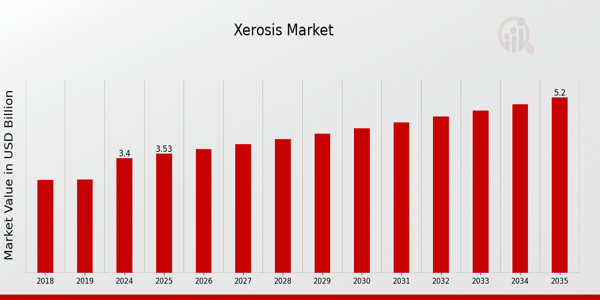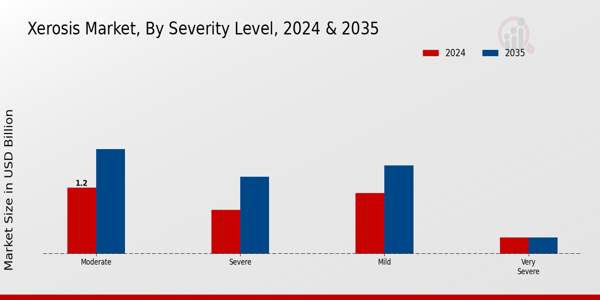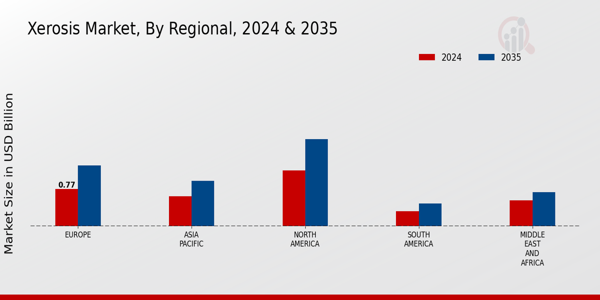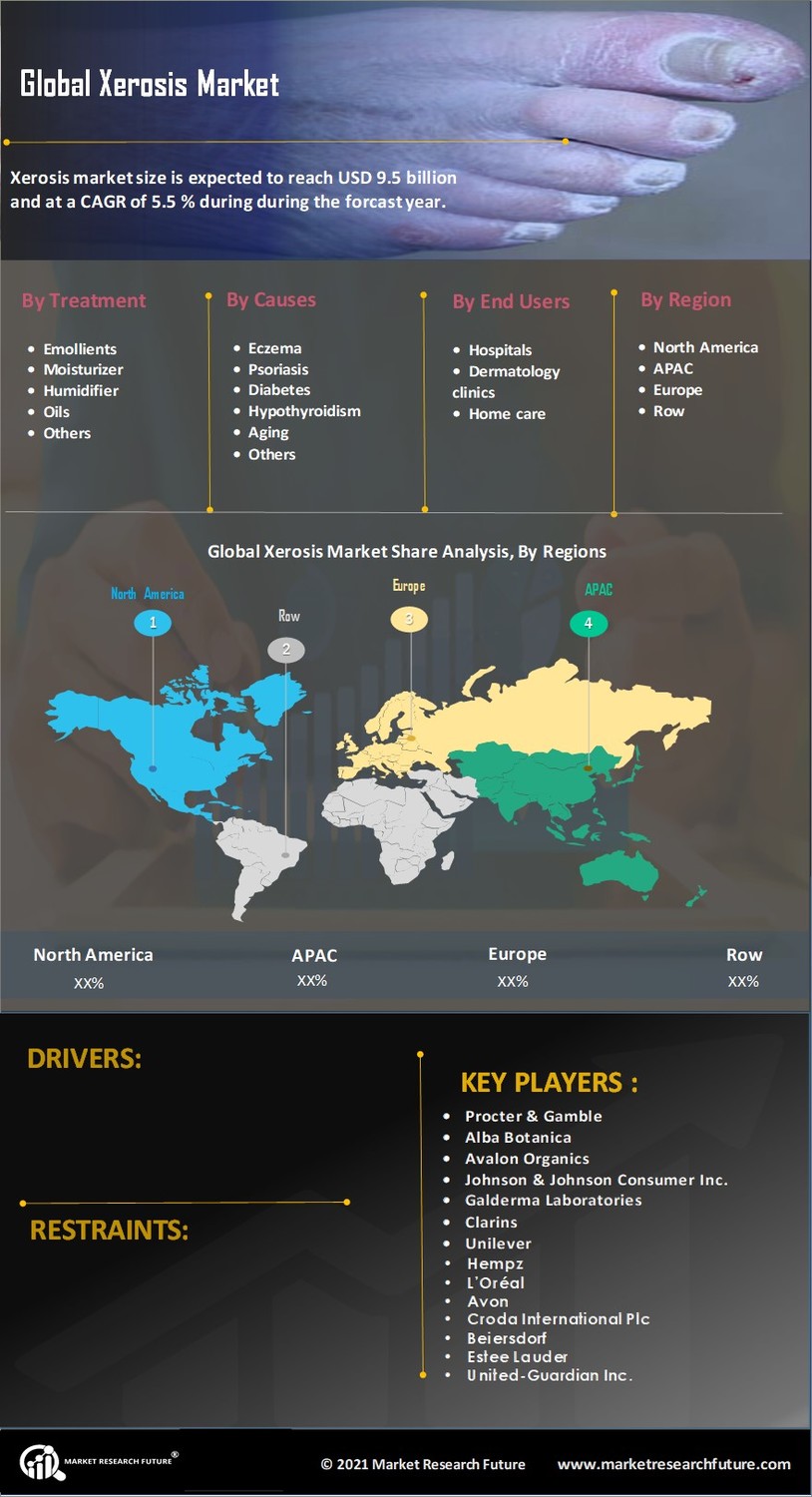Xerosis Market Summary
As per Market Research Future Analysis, the Xerosis Market was valued at 3.27 USD Billion in 2023 and is projected to grow to 5.2 USD Billion by 2035, with a CAGR of 3.94% from 2025 to 2035. The market is driven by increasing awareness of dry skin conditions, the aging population, and rising demand for moisturizing products. The trend towards natural and organic ingredients is reshaping product offerings, while e-commerce is enhancing consumer access to specialized dermatological solutions.
Key Market Trends & Highlights
The Global Xerosis Market is witnessing transformative trends driven by demographic and environmental factors.
- Approximately 25% of adults over 65 are affected by chronic dry skin conditions, increasing demand for effective treatments.
- The skincare market reached approximately 140 Billion USD, with a significant share dedicated to products targeting dry skin.
- Topical Treatments remain popular, addressing hydration and skin barrier repair, forming a significant market portion.
- North America is expected to hold the largest market share, valued at 1.5 USD Billion in 2024.
Market Size & Forecast
2023 Market Size: USD 3.27 Billion
2024 Market Size: USD 3.4 Billion
2035 Market Size: USD 5.2 Billion
CAGR (2025-2035): 3.94%
Largest Regional Market Share in 2024: North America.
Major Players
Key companies include Eucerin, Pfizer, Galderma, Shiseido, Himalaya Wellness, Unilever, Aveeno, Johnson and Johnson, Procter and Gamble, Cetaphil, L'Oréal, Beiersdorf, Bayer, GlaxoSmithKline, Neutrogena.
Key Xerosis Market Trends Highlighted
The Xerosis Market is experiencing several important trends driven by rising awareness of skin health and an increasing prevalence of dry skin conditions. As more consumers seek solutions for maintaining hydration and improving skin health, the demand for high-quality moisturizers, emollients, and specialty creams tailored to treat xerosis is on the rise. Additionally, aging populations across various regions contribute significantly to this market trend, as older adults are more likely to encounter skin dryness due to natural aging processes.
Key market drivers include the growing incidence of environmental factors that lead to xerosis, such as pollution, climate change, and indoor heating.These things make dry skin worse, which makes people want to buy good skincare products. Also, the fact that new formulas that use natural ingredients and cutting-edge technologies are available makes people even more interested in and likely to buy them. E-commerce sites also make it easier for people to find and buy products that are good for their skin.
In developing areas where more people are learning about xerosis and becoming aware of it, new opportunities are opening up. To reach this growing group of buyers, manufacturers can focus on expanding their product lines and marketing strategies in these areas.
The trend toward sustainable and eco-friendly products is also gaining traction globally, encouraging companies to develop environmentally friendly formulations that align with consumer values. Recent times have seen an increase in dermatology-driven initiatives that promote knowledge of skin conditions, thereby creating a more informed customer demographic that is likely to seek effective solutions for xerosis. This trend, coupled with a growing interest in holistic self-care, positions the market for steady growth in the foreseeable future.

Source: Primary Research, Secondary Research, Market Research Future Database, and Analyst Review
Xerosis Market Drivers
Increasing prevalence of skin disorders
The Xerosis Market is significantly driven by the increasing prevalence of skin disorders such as eczema, psoriasis, and atopic dermatitis. According to the Global Burden of Disease Study, skin conditions affect approximately 900 million people globally. As urbanization and pollution continue to rise, skin disorders are expected to become more prevalent over the next decade.
Established organizations like the World Health Organization and the American Academy of Dermatology have noted a correlation between environmental factors and increased skin disorders.This rise in cases stimulates demand for xerosis treatments, leading to potential market growth in the Xerosis Market.
Growing Aging Population
The aging global population is another key driver for the Xerosis Market. As per United Nations data, the number of individuals aged 65 and older is projected to reach 1.5 billion by 2050, indicating a significant increase in demand for products addressing xerosis, which is more common in older adults.
Aging skin has reduced sebaceous gland activity, leading to dry skin and a heightened need for moisturizers and topical treatments.With organizations like the World Health Organization promoting healthier aging practices, the market for xerosis solutions is poised for expansion in the coming decades.
Increase in Disposable Income and Skincare Awareness
An increase in disposable income, especially in emerging economies, is contributing to the growth of the Xerosis Market. The World Bank has reported that global disposable income is rising, leading to enhanced spending on personal care and health products.
This trend is particularly evident in developing nations where awareness of skincare routines is expanding rapidly. As consumers prioritize skin health, they are more inclined to invest in moisturizers and targeted therapies for xerosis, driving the overall market growth.
Advancements in product formulation and technology
The Xerosis Market is benefiting from advancements in product formulation and technology. With ongoing Research and Development efforts, companies are creating more effective xerosis treatments tailored to specific skin types and conditions. For instance, the introduction of ceramide-based moisturizers has gained traction in dermatology as they effectively restore skin barrier function.
Organizations such as the American Society of Dermatology regularly publish findings that encourage innovation in skincare products, enhancing market offerings and consumer choices.This technological progress is critical for meeting the growing demand for specialized xerosis treatments.
Xerosis Market Segment Insights
Xerosis Market Severity Level Insights
The Xerosis Market, particularly focusing on the Severity Level segment, presents a comprehensive view of how different severity stages contribute to market dynamics. In 2024, the overall market is expected to be valued at 3.4 USD billion, demonstrating its growing significance in the healthcare industry. Among the different severity levels, the Mild severity segment holds a majority share with a valuation of 1.1 USD Billion in 2024, which is projected to rise to 1.6 USD billion by 2035.
This segment signifies the most widespread form of xerosis, affecting a large portion of the population with less severe symptoms that can often be managed through over-the-counter treatments, making it crucial for the market growth and accessibility.
The Moderate severity segment is also notable, valued at 1.2 USD Billion in 2024 and expected to grow to 1.9 USD billion by 2035. This segment is essential as it often requires medical intervention, presenting opportunities for advancements in therapeutic options. As awareness around skin health increases, individuals experiencing moderate symptoms are more likely to seek products that cater to their conditions.
Conversely, the Severe severity segment is valued at 0.8 USD Billion in 2024, projected to reach 1.4 USD billion by 2035. Though it accounts for a smaller portion of the market in comparison to Mild and Moderate, it represents a critical area where innovation in treatments is required, as this level of xerosis often leads to complications if not treated properly.
Lastly, the Very Severe segment remains at a stable valuation of 0.3 USD Billion from 2024 to 2035, suggesting a niche but significant market for those experiencing extreme cases of xerosis, which generally requires more intensive treatment solutions and medical care.
The majority of the Xerosis Market revenue emanates from Mild and Moderate categories, indicating the significance of educational efforts directed towards these conditions for treatment-seeking behavior. Understanding the prevalence and impact of each severity level informs strategic market planning and the development of targeted healthcare solutions. As the Xerosis Market continues to evolve and expand, addressing the diverse needs across these severity levels opens numerous pathways for market growth and innovation.

Source: Primary Research, Secondary Research, Market Research Future Database, and Analyst Review
Xerosis Market Treatment Type Insights
The Xerosis Market is witnessing significant growth with a projected market value of 3.4 USD Billion in 2024 and an increasing trend expected to reach 5.2 USD billion by 2035. This growth trajectory is driven by a diverse range of treatment options that cater to various patient needs, including Topical Treatments, Oral Medications, Advanced Therapies, and Home Remedies. Topical Treatments are vital due to their targeted application and immediate relief from symptoms, catering to a broad user base.
Oral Medications provide a systemic approach to managing Xerosis, proving significant for individuals with severe cases.Advanced Therapies are becoming more popular, incorporating innovative technologies that enhance effectiveness, while Home Remedies continue to hold their ground, offering natural and accessible solutions for many individuals. The increasing prevalence of skin disorders, combined with growing consumer awareness about skin health, has cultivated an environment ripe for market growth.
Additionally, advancements in formulation and delivery methods across these treatment types contribute to their rising significance in enhancing patient outcomes in the Xerosis Market.The segmentation within this market showcases the variety of options available, reflecting the increasing focus on personalized and effective treatment strategies.
Xerosis Market End User Insights
The Xerosis Market revenue demonstrates a diverse landscape across various End User categories, which include Hospitals, Clinics, Home Care, and Pharmacies. As of 2024, the overall market is expected to be valued at 3.4 USD billion, reflecting the rising prevalence of xerosis and related skin conditions. Hospitals and Clinics are critical in providing immediate treatment and care for patients suffering from skin dryness, thus significantly contributing to market revenue through comprehensive healthcare services.
Home Care has gained traction due to the increasing preference for at-home management of skin conditions, particularly among the aging population, who often prefer independent living.Pharmacies play a vital role in the distribution of over-the-counter treatments, making them easily accessible to consumers. This segmentation allows for tailored strategies that meet the specific needs of each End User, thereby enhancing overall market growth. Trends in personalized care and increased awareness of skin health are additional driving factors supporting this expansion.
The Xerosis Market data reflects the importance of these segments, as they together form a robust ecosystem catering to the diverse needs associated with xerosis management.Overall, the industry is poised for gradual yet consistent growth driven by evolving consumer demands and advancements in skincare products.
Xerosis Market Formulation Type Insights
The Xerosis Market has seen significant growth, driven by the increasing incidence of dry skin conditions worldwide. In 2024, the market is valued at 3.4 USD billion, showcasing a solid demand for effective skincare products. Among the various types of formulations, creams, lotions, ointments, and gels play a crucial role in catering to diverse customer preferences and needs.
Creams are particularly popular due to their rich texture and ability to provide deeper hydration, while lotions are favored for their lightweight feel, making them ideal for daily use.Ointments are often utilized for their superior occlusive properties, making them effective for severe skin dryness. Meanwhile, gels offer a refreshing alternative, especially in hot climates where consumers seek lighter formulations. This market segmentation reflects a growing awareness of skin health and the desire for personalized skincare solutions.
With the Xerosis Market statistics indicating a continued upward trend, manufacturers have opportunities to innovate and enhance their product offerings, addressing specific skin types and conditions amidst a landscape that demands both efficacy and sensory appeal in formulation types.
Xerosis Market Regional Insights
The Regional segment of the Xerosis Market has been observed to have considerable growth potential, with an overall market value of 3.4 USD billion in 2024, projected to reach 5.2 USD billion by 2035. North America holds a significant share, valued at 1.159 USD Billion in 2024 and expected to rise to 1.812 USD Billion in 2035, demonstrating its dominance due to high product demand and effective distribution channels.
Europe follows closely behind, with a valuation of 0.773 USD billion in 2024 and projected growth to 1.261 USD billion by 2035, reflecting an increasing awareness of xerosis treatment options in the region.South America presents a more modest market, valued at 0.309 USD Billion in 2024, increasing to 0.473 USD Billion in 2035, highlighting its emerging market status with growing healthcare infrastructure. The Asia Pacific region, with a market valuation of 0.618 USD Billion in 2024, is anticipated to reach 0.945 USD Billion by 2035, driven by rising incidences of dry skin and a burgeoning population.
Lastly, the Middle East and Africa, valued at 0.541 USD Billion in 2024 and likely to increase to 0.709 USD Billion by 2035, signifies its rising healthcare initiatives catering to skin health.The insights derived from Xerosis Market data illustrate the diverse growth across regions, influenced by factors such as healthcare advancements, aging populations, and increasing skin disorders, all contributing to the overall market growth.

Source: Primary Research, Secondary Research, Market Research Future Database, and Analyst Review
Xerosis Market Key Players and Competitive Insights
The Xerosis Market is characterized by increasing consumer awareness regarding skin care and the heightened prevalence of skin-related conditions. This market encompasses a wide range of products aimed at alleviating the symptoms of xerosis, which is marked by excessive dryness of the skin. Various players in this competitive landscape are consistently innovating their product portfolios, introducing new formulations and delivery systems to cater to the evolving needs of consumers. The market dynamics are shaped by an array of consumers' preferences, regulatory changes, and ongoing research and development efforts, leading to significant competition among both established brands and emerging players.
Companies are also adopting strategic partnerships and collaborations to enhance their market standing and reach a broader audience.Beiersdorf has carved out a significant presence in the Xerosis Market, primarily due to its strong reputation for quality and efficacy in skin-care products. The company has a robust portfolio that features various formulations designed specifically for dry skin relief, which appeals to a diverse demographic seeking effective skincare solutions. Beiersdorf's strengths lie in its commitment to innovation, with continuous investment in research to develop advanced products that address consumer needs and preferences.
Moreover, the brand's extensive distribution network enhances its accessibility in both developed and emerging markets, enabling it to capture a wider audience. This comprehensive approach ensures that Beiersdorf remains a key player within the Xerosis Market, maintaining a competitive edge through technological advancements and consumer-centric strategies.Novartis also plays a pivotal role in the Xerosis Market through its innovative healthcare solutions, focusing on dermatological care and specialized products that target xerosis effectively. The company boasts a strong portfolio of prescription medications and dermatological therapies aimed at treating skin conditions associated with dryness.
Novartis leverages its deep expertise in biopharmaceuticals to develop targeted therapies that provide relief for patients suffering from severe forms of skin dryness. The company has a global market presence, further amplified by strategic mergers and acquisitions, enabling it to enhance its product offerings and operational capabilities. Novartis emphasizes research and development, leading to the introduction of groundbreaking treatments that not only address the symptoms of xerosis but also improve patients' quality of life. Through its dedication to advancing dermatological care, Novartis continues to strengthen its position within the competitive landscape of the Xerosis Market.
Key Companies in the Xerosis Market Include
- Beiersdorf
- Novartis
- Unilever
- Bayer
- Pfizer
- Galderma
- Eucerin
- Sanofi
- Johnson & Johnson
- L'Oreal
- Procter & Gamble
- AbbVie
Xerosis Market Developments
The Xerosis Market has been steadily growing since July 2025, thanks to the growing need for effective and scientifically proven skin care products. Beiersdorf and Galderma are still at the forefront of innovation with their main brands, Eucerin and Cetaphil, which offer targeted solutions for dry skin and barrier repair. In 2023, companies like Johnson & Johnson (through Aveeno) and Unilever (through Dove and Vaseline) put more money into research and development.
This led to the release of new moisturizing technologies that meet a wider range of skin needs.Some pharmaceutical companies have shown interest in dermatology from time to time, but as of March 2023, there were no confirmed purchases by Novartis or collaborations between AstraZeneca and Pfizer in the treatment of xerosis. Consumer demand for sustainability is also changing the market.
For example, big companies like L'Oréal and Procter & Gamble are changing their products to include biodegradable packaging and clean-label ingredients.The market's positive outlook is still fueled by larger factors like an aging population, skin that is becoming more sensitive, and more awareness through dermatological campaigns. The Xerosis Market is ready to keep growing as long as companies meet both clinical and consumer needs.
Xerosis Market Segmentation Insights
Xerosis Market Severity Level Outlook
- Mild
- Moderate
- Severe
- Very Severe
Xerosis Market Treatment Type Outlook
- Topical Treatments
- Oral Medications
- Advanced Therapies
- Home Remedies
Xerosis Market End User Outlook
- Hospitals
- Clinics
- Home Care
- Pharmacies
Xerosis Market Formulation Type Outlook
- Creams
- Lotions
- Ointments
- Gels
Xerosis Market Regional Outlook
- North America
- Europe
- South America
- Asia Pacific
- Middle East and Africa
|
Report Attribute/Metric
|
Details
|
|
Market Size 2023
|
3.27 (USD Billion)
|
|
Market Size 2024
|
3.4 (USD Billion)
|
|
Market Size 2035
|
5.2 (USD Billion)
|
|
Compound Annual Growth Rate (CAGR)
|
3.94% (2025 - 2035)
|
|
Report Coverage
|
Revenue Forecast, Competitive Landscape, Growth Factors, and Trends
|
|
Base Year
|
2024
|
|
Market Forecast Period
|
2025 - 2035
|
|
Historical Data
|
2019 - 2024
|
|
Market Forecast Units
|
USD Billion
|
|
Key Companies Profiled
|
Beiersdorf, Novartis, Unilever, Bayer, Pfizer, Galderma, Eucerin, Sanofi, Johnson & Johnson, L'Oreal, Procter & Gamble, AbbVie
|
|
Segments Covered
|
Severity Level, Treatment Type, End User, Formulation Type, Regional
|
|
Key Market Opportunities
|
Rising geriatric population demand, Increasing prevalence of skin disorders, Growth in dermatological product innovation, Expansion in e-commerce for dermatology, Enhanced awareness of skincare routines
|
|
Key Market Dynamics
|
Increasing prevalence of dry skin, growing awareness of skin health, rising demand for skincare products, innovations in treatment options, aging population are driving market growth.
|
|
Countries Covered
|
North America, Europe, APAC, South America, MEA
|
Xerosis Market Highlights:
Frequently Asked Questions (FAQ):
The Xerosis Market is expected to be valued at 3.4 USD Billion in 2024.
By 2035, the Xerosis Market is projected to reach a value of 5.2 USD billion.
The expected CAGR for the Xerosis Market from 2025 to 2035 is 3.94%.
North America holds the largest market share in the Xerosis Market, valued at 1.159 USD billion in 2024.
The market value of the Xerosis Market in Europe is expected to be 0.773 USD billion in 2024.
Key players in the Xerosis Market include Beiersdorf, Novartis, Unilever, Bayer, and Pfizer.
The market size for the Mild severity level of Xerosis is valued at 1.1 USD Billion in 2024.
Emerging trends and increasing awareness about skin health present significant opportunities within the Xerosis Market.
The Severe severity level of Xerosis is projected to reach a market value of 1.4 USD billion by 2035.
By 2035, the Asia Pacific region is expected to have a market value of 0.945 USD billion in the Xerosis Market.

















